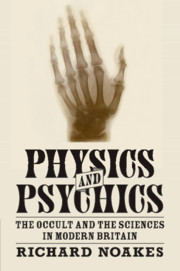Book contents
- Physics and Psychics
- Science In History
- Physics and Psychics
- Copyright page
- Dedication
- Contents
- Figures and Tables
- Acknowledgements
- Abbreviations
- Introduction
- 1 New Imponderables, New Sciences
- 2 A Survey of Physical–Psychical Scientists
- 3 Physical Theories and Psychical Effects
- 4 Psychical Investigation as Experimental Physics
- 5 Expertise in Physics and Psychics
- 6 Modernising Physics and Psychics
- Conclusion
- Bibliography
- Index
6 - Modernising Physics and Psychics
Published online by Cambridge University Press: 27 September 2019
- Physics and Psychics
- Science In History
- Physics and Psychics
- Copyright page
- Dedication
- Contents
- Figures and Tables
- Acknowledgements
- Abbreviations
- Introduction
- 1 New Imponderables, New Sciences
- 2 A Survey of Physical–Psychical Scientists
- 3 Physical Theories and Psychical Effects
- 4 Psychical Investigation as Experimental Physics
- 5 Expertise in Physics and Psychics
- 6 Modernising Physics and Psychics
- Conclusion
- Bibliography
- Index
Summary
Chapter Six examines the trajectory of physical-psychical scientists in the early twentieth century.By 1900 the network of physical-psychical scientists was weaker because many had died or were too old or busy to commitment themselves to new experimental enquiries. Those strongly committed to psychical research tended to explore connections between physics and psychics via writing rather than new experiments.The writing of Lodge, Barrett, Kingsland and others explored the connections between psychical research and modern developments in physics and religion.Many thought that Lodge’s connections went too far while others did not think the connections went far enough.Among those who sought to transcend Lodge wereprofessional and amateur radio enthusiasts, and psychical researchers, and a younger generation of psychical researchers who believed relativity and quantum theories was more effective than older, mainly ether-based physics, at rendering psychical effects plausible.
Keywords
- Type
- Chapter
- Information
- Physics and PsychicsThe Occult and the Sciences in Modern Britain, pp. 281 - 327Publisher: Cambridge University PressPrint publication year: 2019

